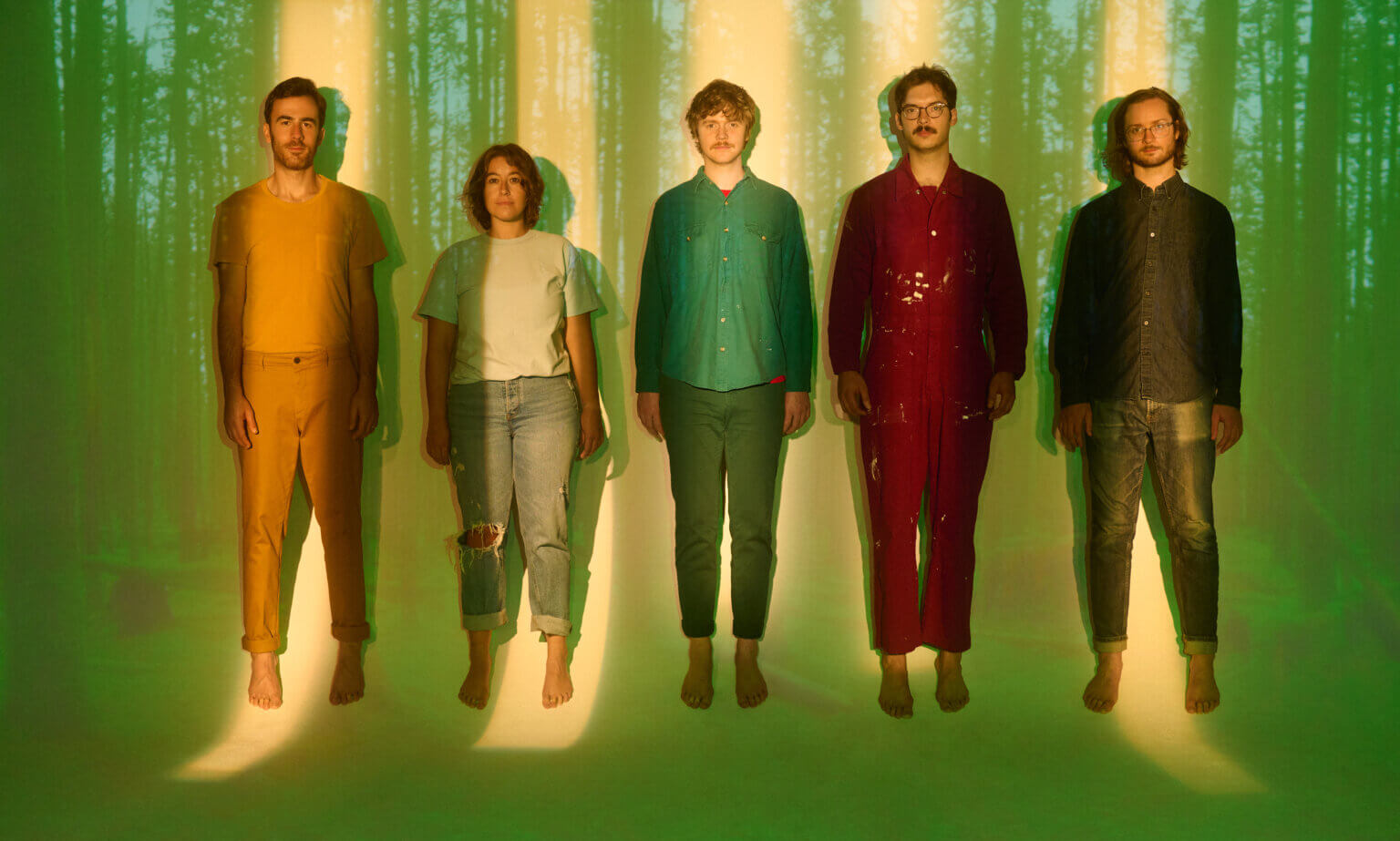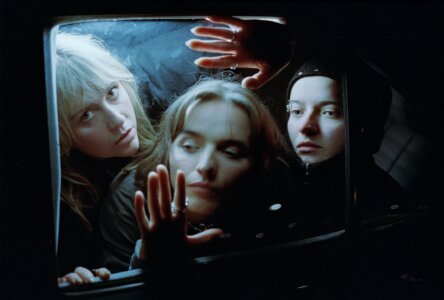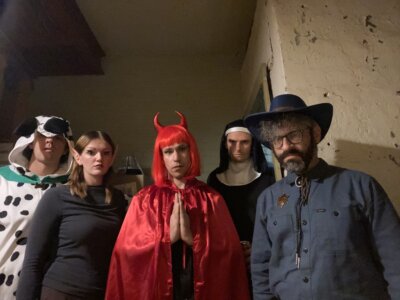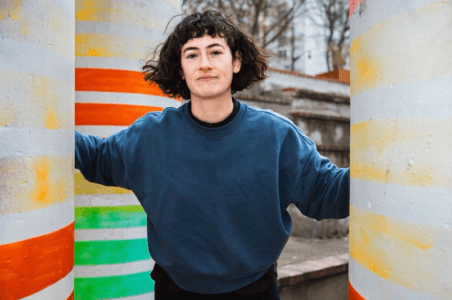Pinegrove Remain a Truly Conscious Band

Pinegrove’s album, 11:11, which came out the end of last month, covers a lot of ground. From more assertive to more meditative, hopeful to blue, in both sounds and words. It is an album that tackles the problem of climate change as Evan and his friends see it, but it is so much more. It deals, as well, in community and mutual support, disappointment, both on a personal and grand scale, and just, you know? Wanting to be alive. I sat down with Evan, the day after my birthday (it was a real gift to hear him expound upon an album I’ve been so moved by), and he shared some of his thoughts on the themes of the record, the pandemic and our collective safety, and even the word play that is present in the album.
NORTHERN TRANSMISSIONS: I’ve been an admirer of your music since your band’s performance of “Aphasia” on Audiotree. It hit me, like no other song had hit me before. And the album Cardinal was an alt-country revelation for me, something that brought that folk aesthetic into the indie rock territory in a way I’d never heard before. This album continues that wonderful formula. But you opened this album with a lot harder sound on “Habitat”, which took me off guard but I enjoyed, and there are other heavy parts on the record. Are you purposefully heading towards a heavier sound? Why did you start the record with that song?
Evan Stephans Hall: Well, yeah, I wanted it to start with “alarm bells,” kind of. You know, something that really was attention grabbing. There was a lot of discussion about whether it was too adventurous to start with a seven minute song, but ultimately we felt like the range of that song. Yeah, you point out that it’s really loud in the beginning, but it goes to a pretty sort of meditative almost hypnotic place later. So basically we thought that song was sonically diverse enough to sort of introduce the range of sounds that they might encounter on the album.
NT: In some ways this is your pandemic record, but there’s a surprising amount of references to nature in the album. You must not have stayed inside. How did nature help you in lockdown?
ESH: Yeah, well, definitely at first when we were still trying to figure out exactly how communicable this thing was and how it spread. You know, staying indoors was absolutely the move. But as the weather began to get warmer, I realized that going out on a hike, as long as you bring a mask for when you pass other people, then that’s totally okay. And anyway, several of us live in the Hudson Valley, which is upstate New York. Comparatively rural, compared to any city, there’s a lot of open spaces and a lot of hikes. Yeah, it was a good time, a BANNER time for hiking, actually. I went out as often as possible.
NT: That leads into the next question, that is how Nature, and specifically climate change, is a big theme on this record. Like the songs “Alaska” and “Orange.” You even deal complexly with how nature is not always the comfort we hope it would be, like on the song, “Flora.” How do you feel like art and music deals with these issues, like our relationship with nature, in a way that politics or journalism can’t?
ESH: Okay, great question. So I suppose I wanna maybe add to your interpretation of “Flora” a little bit. I mean for me, this song, is almost an apology to nature. It’s like, it’s not so much that nature isn’t doing enough for me, but the other way around maybe. And kind of a supplication to it, or a prayer to it. So it’s kind of like remember how things were, or a naive and primal, but uncomplicated relationship with nature, how that used to be and how that’s transitioned into an almost mournful. I mean, personally learning what was going on.
I think that it was only really once, this is stuff that I was thinking about, but only once it began to be stuff that I was FEELING did it makes sense to write songs about it. I’m not really attempting to do the same thing that a scientist or a politician or somebody who’s really fact based. My inquiry is of a different nature. And I guess maybe the advantage there is that maybe you can connect with somebody in almost a less mediated form. Just straight to the heart. Ideally. You know? Ideally, I hope that people might find some comfort in recognition in these songs. You know, that there’s somebody who’s concerned about the same things. And It’s also my hope with this album, I tried to begin to imagine what a better world could look like. At least like from an aesthetic perspective, the aesthetic priorities are in some ways powerful and in some ways limited. But within that limitation I think there’s actually a lot of opportunity.
NT: Are there artists that are tackling climate change that you admire right now or maybe even informed the record?
ESH: Um well, I’ve been recommended a few albums through the course of these interviews that I mean to check out. But maybe one thing that I think in certain ways kind of similar to what I’m going for is the movie Don’t Look Up. I think that that’s a movie that is trying to make the medicine go down with humor, and maybe I’m trying to say something where melody is the catchy or accessible element. But I also, in certain ways I think it is a mistake to say that this album is only about climate change, or only about… I mean really it’s just sort of how I was feeling in 2020. It’s kinda semi autobiography and these were the things I’m thinking about. And you’ll see not every song focuses on it. But each song, I think, is maybe a room in the house. And they all kinda connect in certain ways and hopefully strengthen each other or speak to each other. But yes, I hope that people focus on the climate element because it’s time to do something, and I love the opportunity to talk to it in music magazines or music publications, about the climate crisis. To maybe start conversations or to encourage people to get involved in local climate organizing.
NT: “Iodine” comes up a number of times on the record, and even has a song named after it. I think iodine is what you find in eye drops? Any more hints as to what iodine could mean to the album? Or what other metaphors would you wanna highlight?
ESH: So yeah, my lyrical strategy involves reoccurent images and I like to drop images across different songs as a way for them to be in conversation with each other [Like “An eye for an eye of iodine” in the next song.] I think with that one truthfully, I may have just been playing with sounds a little bit. But then there’s, I was sort of imagining. There’s this music video by Girl Pool for this song “1, 2, 3” where there’s just these kind of grotesque tears made of, I guess they do green, but I read that as an allegory for depression and how that might emerge in social situations. And the video’s absolutely gorgeous. Incidentally, Billie Eilish has a video with a similar concept, but “1,2, 3” came first. That’s the one I’m talking about in the song, and it’s kind of a coincidence that iodine is more of a black substance… But I kinda was thinking about that music video and there’s a line in “Araby” by James Joyce about singing “from room to room.” He’s like alone in his house and something mildly heartbreaking has happened and he just kind of processes it by singing. So this is I think, like a lot of the songs, a little bit meta-referential, like this is a song about processing emotion which I am also doing and enacting by writing the song.
NT: I noticed that you rhymed “orange” with “ignore it” in the song with the same name, the age old challenge for poets and songwriters, that Eminem tackled years ago, with “door hinge,” and “syringe”. How much of your writing originates from giving yourself particular writing challenges or creative parameters like that? Or is that just a byproduct of a mind that’s always thinking about how to craft words?
ESH: Yeah, well I think maybe those things are related. Like you’re interested in words, I’M interested in words, so I like to give myself little challenges. But really, when I’m writing a song, I don’t think there’s generally a particular agenda that I set out. I’m just looking for little opportunities. If I have an idea, it’s like, how can I kinda hitch the trailer onto this idea and then start a train car. So with “Orange,” yeah, I mean, that is sort of the joke, in a way. That I’m trying to rhyme the impossible and that’s there some kinda feeling like we’re trying to overcome the impossible. But only when I got to that point in the song and I realized I wanted a double chorus, did I realize there could be that opportunity and then I started to think it through and I was rather pleased with how that particular part came out. You know, you win some, you lose some. And the ones that aren’t so good, I leave off the album.
NT: You did super interesting and humorous write ups of your band mates, leading up to the release of 11:11 on Facebook. And then there’s the community rich film Amperland that you made in 2021, with proceeds going to the Sunrise Movement. How important is the collaborative spirit in writing a Pinegrove record? How did the pandemic effect that this time around?
ESH: Good question, again. Thanks for all these thoughtful questions. So, generally, the process is that I will have a song pretty well-finished by the time I bring it to Zack, who plays drums in the band. And then he and I will be kind of deciding the rhythmic emphases and his parts, and you know, usually I’ll have some idea for a part…. I think that we started those sessions in September, 2020, which was before testing was widely available, before the vaccine, and before we knew that much about how it was transmitted. So it felt like a risk to do that. But us two and Sam Skinner, who produced the album with me, and engineered the album; we kinda just like for two weeks stayed in our apartments, except for band practices that I was having with Zack, just one on one. And then we brought it to Levon Helms’ studio, and recorded the drums there. And this one, I think by virtue of the times, I maybe played more of the instruments than we had at least for Skylight and Marigold. And this was Megan Benavente’s first time playing bass on a record with new songs. She’s on Amperland, of course. But this one was the first time developing parts together. And she lives on the west coast. We did all that remotely. That was an interesting and really rewarding challenge, actually…. Definitely community and playing these songs with all of these really smart musicians. And good composers in their own right. Always end up deepening what the song can do. I also co-wrote, “Let,” with Sam Skinner on this album…. Unfortunately, in America copywriter law, arrangement isn’t acknowledged. So we try to come up with creative solutions to compensate the creative labor, members of the band, in other ways. I mean, royalties. That’s how we figured out how to do it, for anyone who’s kind of curious about the way that breaks down. And live, that’s an even split for us for guarantees. Cause everyone’s playing their part. I just bring that up, cause I’m curious about how other bands do it, and other bands might be curious about how we have settled on to acknowledge the creative labor that’s not acknowledged by copywriter law.
NT: On “Let” you start out with “I let you down today” after singing “I’m not gonna let you down” in the song “Respirate” before. As a community builder, how important is processing these two very human realities?
ESH: Right. So important. I think that I kind of meant to highlight, the gulf that sometimes exists between expectation and effort and what ends up happening, and how difficult relationships can be. I think, my relationship with my band, though it’s not a specific. I sort of intended to keep this song general enough for somebody to step in, and think about what accountability means for them. Or, acknowledgement that you kind of hurt your friend’s feelings. I could be, I hope that it was open enough, to possibly be interpreted in a variety of ways, based on who’s listening. Of course, it’s inspired by my life, but I meant it a little bit more broadly than that. And also, I suppose that this album is trying to grapple with disappointment in different ways. Everything from personal, or interpersonal disappointment, to disappointment about our political leaders, and kind of everything in between. And I was hoping to suggest that the emotions we feel have applications on different scales. And there might be something worth investigating in order for us to become more emotionally intelligent. To kind of consider how disappointment at our leaders and personal disappointment, or disappointment in our communities. And how you can grow from that sort of thing.
NT: You’ll be finally playing live again. How excited are you for that?
ESH: Well, really excited. And we talk about community building. I feel like, that’s one way that we practice coming together. Is to be able to sing together. And just that kind of aural manifestation is a really strong metaphor. But it’s also not a metaphor. It just like it is the thing that it is. It’s practice. So I think it’s really spiritually multivalent. So I can’t wait. But I also need to say, that it’s still a risk and there are things that people can do to decrease the risk. And I really hope that people will be taking the community into account, when they are deciding, you know, what their plans are before the concert. The week before the concert. That people are still responsible about wearing masks in public spaces and especially indoor spaces. And that people will consider taking a test before they come to the concert. You know, there are things that we can do to mitigate the risk. And we should not be pretending, ah, well, there’s almost a million people dead, so what can we do? We see it so often, this idea that if you can’t do everything, then we shouldn’t do anything. And I think that that’s one idea, actually, that this album is really trying to rebut. Or at least address. That no, there’s PLENTY that we should be doing. Yes, it’s disappointing that we can’t do everything. But there’s a lot that we can still do.
NT: How has the reception been to the new album for Pinegrove?
ESH: Oh, it’s great! It’s great! It’s so good. I’m getting so many notes from friends and family who are connecting with the record. And that’s why I do it, these are the people I do it for. I haven’t really been reading reviews all that much this time and that feels pretty, healthy. Because when it comes down to it, I’m making music for me, and for my band, and for my friends and for my family. Of course, everybody’s invited, but. But it’s my local community that I MEAN it for. And the fact that the reception there has been really strong means the world to me. It’s gratifying, affirming. And it makes me have confidence to write other songs that I hope people will connect with those. That’s it. I think our goals in a certain way are kinda modest. We just wanna keep making music and we’re really privileged to have an audience who cares about what we’re doing. And if we can start a conversation or continue a conversation about the climate crisis and about building community and trying to imagine a better world, then all the better.
Order 11:11 by Pinegrove HERE
Latest Reviews
Trending
Tracks
Advertisement
Looking for something new to listen to?
Sign up to our all-new newsletter for top-notch reviews, news, videos and playlists.









